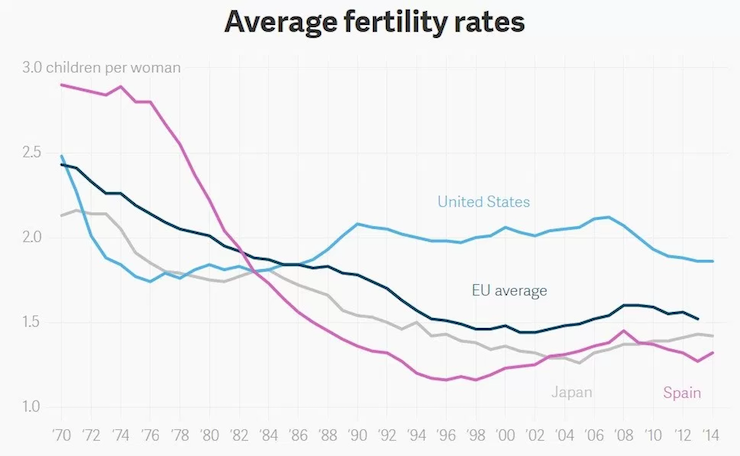

New research shows the relationship between marriage, health and well-being.
The tax-and-transfer welfare state is in deep trouble. I explained last year that the United States faces a very serious long-run challenge.
Many of our entitlement programs were created based on the assumption that we would always have an expanding population, as represented by a population pyramid. …however, we’ve seen major changes in demographic trends, including longer lifespans and falling birthrates. The combination of these two factors means that our population pyramid is slowly, but surely, turning into a population cylinder. …this looming shift in America’s population profile means massive amounts of red ink as the baby boom generation moves into full retirement.
In other words, in the absence of genuine entitlement reform, America will have a Greek-style fiscal mess at some point in the future. Or, as I wrote yesterday, maybe we should call it a Japan-style mess.
Simply stated, we’re going to have too many people collecting benefits and too few people generating income.
The outlook is even worse in Europe. Indeed, the fiscal crisis has already started in many nations in Southern Europe. And the crisis will spread to many countries in Northern Europe. And it will hit Eastern Europe as well, notwithstanding some good economic reforms in that region.
Unfortunately, most politicians are reluctant to undertake the entitlement reforms that would avert this crisis.
So what’s their alternative solution? In many cases, they don’t have one. In other cases, they act as if higher tax burdens can solve the problem, even though that probably means even more people will be discouraged from productive lives and instead decide to ride in the wagon of government dependency (higher taxes also would enable even more spending, but that’s a separate story).
Another potential answer is sex. To be more specific, governments around the world are urging people to procreate more so that there will be additional future taxpayers to finance the welfare state.
I’m not kidding.
Let’s start with the new effort in Spain.
Europeans across the continent are having so many fewer babies that national populations from Scandinavia to the Mediterranean are skewing towards the older end of the spectrum, with not enough young, productive people to keep economies thriving and to look after the rest of the aging population. Spanish women have 1.3 children on average. In 2015, Spain’s death rate outstripped the birth rate… Edelmira Barreira Diz was appointed as “commissioner for the demographic challenge” last month.
I think “sex commissioner” would have been a better title. Heck, that probably would have enticed a certain former American president to apply for the position.
Here’s a chart from the story showing declining fertility rates.

There’s a similar effort for government-encouraged babies in Italy.
Italy is facing a dramatic demographic change, with increasingly fewer children being born. So the Health Ministry recently launched an ad campaign to remind people of Sept. 22 being “fertility day.” …another ad claiming that fertility was “a common good” — a comparison that reminded some of fascist propaganda from the 1920s which urged women to have more babies to support the nation. …As a social welfare state, Italy’s pensions system and economy relies on a certain number of younger people joining the workforce every year.
The Danish government also wants women to think they have an obligation to produce future taxpayers.
In Denmark, for instance, schoolchildren are now taught in class that they should have more babies. “…we just thought, maybe we should actually also tell them about how to get pregnant,” Marianne Lomholt, national director of Sex and Society, told the New York Times. …Denmark’s Education Ministry now has teachers talk not only about the dangers of sex and pregnancies, but also about their benefits.
Also in Denmark, private companies are jumping on this bandwagon (sexwagon?) of more sex as a solution to demographic-entitlement crisis.
Denmark has a sex problem. …not exactly a sex problem, per se. It’s more like a baby problem. …Denmark’s perennially low birth rate…has left people worried… “We are concerned. The fewer Danes means fewer people to support the aging population…” …can vacation sex save the Kingdom of Denmark? Spies thinks it can, so the company has sweetened the deal. According to its promotion, the company will give prizes to couples who get pregnant while on vacations purchased through them.
Given the grim demographic outlook in Japan, nobody should be surprised that the government there is agitating for more future taxpayers.
A comprehensive plan to reverse Japan’s crashing population numbers was unveiled on Thursday by a government task force… Shigeru Ishiba, minister in charge of overcoming population decline and reviving local economies, was more blunt. “Japan will die off” without proper countermeasures, he warned. …The strategy outlined in the government plan is to encourage young people to relocate to areas outside the major metropolitan regions by fostering jobs and economic growth in small local communities that are now in danger of simply disappearing for lack of inhabitants.
Huh?!? Japan’s repeated forays into Keynesian economics haven’t generated good results nationally, so I’m not holding my breath that this new campaign will be “fostering jobs and economic growth” in targeted communities.
For a final example, let’s shift to China, where a government that formerly forced women to have abortions is suddenly looking at ways to subsidize an extra child.
China is considering introducing birth rewards and subsidies to encourage people to have a second child… the country issued new guidelines in late 2015 allowing all parents to have two children amid growing concerns over the costs of supporting an aging population. …China began implementing its controversial “one-child policy” in the 1970s in order to limit population growth, but authorities are now concerned that the country’s dwindling workforce will not be able to support an increasingly aging population.
Since coerced redistribution isn’t nearly as odious as coerced abortion, I guess this is another sign of progress in China.
But I’m not sure that will be enough to produce enough future taxpayers for China. Or any other nation.
The only sustainable welfare state, given modern demographics, is no welfare state.
Or, to be more accurate, the right approach is to start with the default assumption that people are responsible for saving and investing to support themselves in retirement. There are lots of nations that now have systems of personal retirement accounts, and this puts them in much stronger position than nations that rely solely on tax-and-transfer entitlement schemes. Hong Kong is a good example, as are Chile and Australia.
By the way, countries with private social security systems have safety-net programs for destitute seniors, but that’s far more affordable than automatic payments to everyone in retirement.
P.S. On a related note, there’s a big debate in academic circles about whether the welfare state (specifically young-to-old redistribution) actually sows the seed of its own destruction by inducing lower fertility rates. Ramesh Ponnuru of National Review summarized some of the evidence for this hypothesis back in 2012.
A 2005 paper for the National Bureau of Economic Research by economists Michele Boldrin, Mariacristina De Nardi, and Larry E. Jones points out that “the size and timing of the growth in government pension systems” matches up nicely with fertility trends in the U.S. and Europe. They expanded on both sides of the Atlantic Ocean, and fertility fell on both sides, after World War II; and they expanded more in Europe, where fertility fell further. In their model, entitlements account for roughly half of the decline in fertility, and 60 percent of the difference between European and American fertility. When a pension system expands by 10 percent of GDP, the average number of children per woman drops by 0.7 to 1.6. “These findings are highly statistically significant and fairly robust to the inclusion of other possible explanatory variables.” A 2007 paper by Isaac Ehrlich and Jinyoung Kim, also for the NBER, reached similar conclusions, finding that pension programs explained a little under half of the decline in fertility rates, and a little more than half of the decline in marriage rates, in developed countries between 1965 and 1989. One implication of this finding is that pension programs have contributed to their own financial woes by suppressing fertility.
Some researchers have concluded that other types of redistribution spending can boost fertility, though other scholars are more skeptical.
I haven’t studied this literature on subsidized babies enough to have a strong opinion.
For what it’s worth, I suspect the government can provide enough handouts to induce motherhood (heck, one of the motives for the welfare reform that was adopted during Bill Clinton’s presidency was a concern that the old system was encouraging women to have children out of wedlock).
But I’m very doubtful that such policies would fix the demographic/entitlement crisis that threatens most nations. In part, because I’m skeptical about the ability of governments to cause large shifts in fertility, but also because recreating a population pyramid only works if the additional children wind up being productive workers in the private sector.
In other words, the goal isn’t really a population pyramid as much as it’s a shift in the ratio of producers versus dependents in a nation.
As such, if many of the babies induced by handouts come from mothers that rely on welfare, and if those children are less likely to grow up to be net payers of tax rather than net consumers of tax, then baby subsidies are not going to solve the problem.





